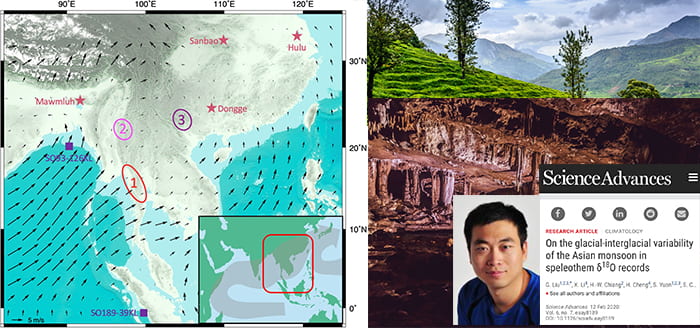In second place of the CoS Science Communication Writing Competition is Wong Minn Lin from the Asian School of the Environment! She wrote about “Lessons in climate change, learned from the past.” Congratulations, Minn Lin!
The importance of understanding climate change: CNA commentary by ASE Assoc Prof Adam Switzer
The year 2019 concluded a decade of consistently rising global temperatures, rapidly retreating ice sheets, and record sea levels – all driven by greenhouse gases produced for the most part by human activities.
Assoc Prof Adam Switzer new Permanent Representative of Singapore to the CCOP and leading a Singapore team for an International IAEA wetland project
Associate Professor Adam Switzer has been selected as the new Permanent Representative of Singapore to the Coordinating Committee for Geosciences Programmes in East and Southeast Asia (CCOP).
Mystery of the Asian monsoon’s historic unresponsiveness to glaciation in East Asia set straight in new study from ASE/EOS
The Asian monsoon is the world’s largest weather system and affects the lives and livelihoods of about half the world’s population. Current human-induced climate change is affecting the Asian monsoon and causing it to change in various ways, with potentially huge socioeconomic consequences.
ASE visit by IPBES co-chair Professor Sandra Diaz – one of 10 scientists that mattered most in 2019
Last month, the ASE had the pleasure of hosting Professor Sandra Diaz from the University of Cordoba, Argentina, for a week. Prof Diaz is Co-chair of the IBPES (Intergovernmental Science-Policy Platform on Biodiversity and Ecosystem Services), which stood behind the Global Assessment Report on Biodiversity and Ecosystem Services last year.
Tier 2 grant to Asst Prof Tong Ping – Uncovering the subsurface Earth with seismic imaging
Congratulations to Asst Prof Tong Ping, who has been awarded an MOE Tier 2 grant! Asst Prof Ping is jointly employed by ASE and SPMS, and his research spans several disciplines, as he uses skills from math and computing to solve problems in geophysics and earth science.
Tropical Indian Ocean sea level historically much more sensitive to climate change than the Pacific and Atlantic
The sea-level of the Indian Ocean is rising at a rate and magnitude nearly twice the global average, but insufficient data records have stood in the way of understanding this strong response to climate. In a study recently published in Nature Geoscience, ASE/EOS researchers Dr Kyle Morgan, Research Assistant Ke Lin, A/P Xianfeng Wang and Keven Roy together with colleagues from Canada, Australia and New Zealand tracked relative sea level change on coral atoll islands in the Maldives over the past two millennia.
Science Communication Writing Competition: Merit Prize winner Soon Kit Ying (ASE)
The inaugural CoS Science Communication Writing Competition was held from 11 Nov 2019 to 10 Jan 2020. We received many submissions, and a panel of judges consisting of faculty from CoS judged the entries and shortlisted the winners! First up, winner of the Merit Prize, Soon Kit Ying from the Asian School of the Environment! She wrote about “Reflecting on Our Sea Level – The Use of GNSS-Interferometric Reflectometry to Study Sea-level Trends.” Congratulations, Kit Ying!
Congratulations to the 2019 Global Undergraduate Awards winners!
And the winners from College of Science are…
MOE Tier 2 grant to Assoc Prof Xianfeng Wang: Predicting future monsoon patterns through cave proxy of past rainfall variation
It is hard to underestimate the importance of the Asian monsoon; the world’s largest weather system, affecting almost half of the world’s population, and the base of food security and water supply in Southeast Asia, large parts of China and beyond. With climate change comes more frequent high intensity downpours during the wet season, and the monsoon season also becomes more difficult to predict.








